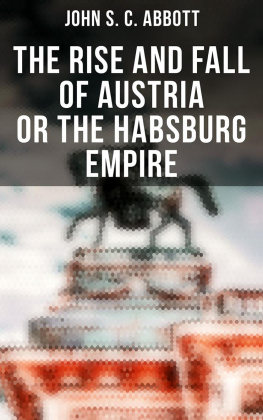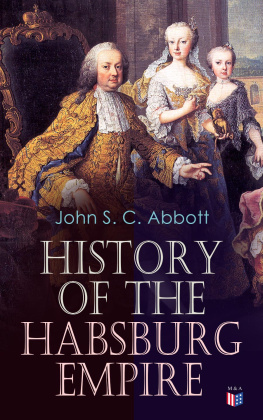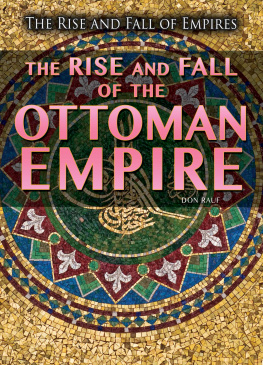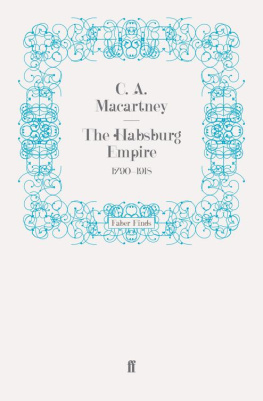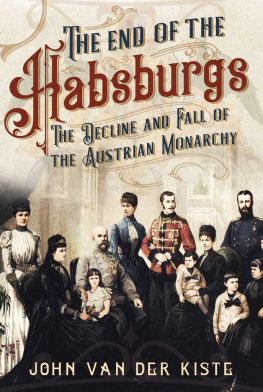PREFACE
The studies of the author of this work, for the last ten years, in writing the "History of Napoleon Bonaparte," and "The French Revolution of 1789," have necessarily made him quite familiar with the monarchies of Europe. He has met with so much that was strange and romantic in their career, that he has been interested to undertake, as it were, a biography of the Monarchies of Continental Europetheir birth, education, exploits, progress and present condition. He has commenced with Austria.
There are abundant materials for this work. The Life of Austria embraces all that is wild and wonderful in history; her early struggles for aggrandizementthe fierce strife with the Turks, as wave after wave of Moslem invasion rolled up the Danubethe long conflicts and bloody persecutions of the Reformationthe thirty years' religious warthe meteoric career of Gustavus Adolphus and Charles XII. shooting athwart the lurid storms of battlethe intrigues of Popesthe enormous pride, power and encroachments of Louis XIV.the warfare of the Spanish succession and the Polish dismembermentall these events combine in a sublime tragedy which fiction may in vain attempt to parallel.
It is affecting to observe in the history of Germany, through what woes humanity has passed in attaining even its present position of civilization. It is to be hoped that the human family may never again suffer what it has already endured. We shall be indeed insane if we do not gain some wisdom from the struggles and the calamities of those who have gone before us. The narrative of the career of the Austrian Empire, must, by contrast, excite emotions of gratitude in every American bosom. Our lines have fallen to us in pleasant places; we have a goodly heritage.
It is the author's intention soon to issue, as the second of this series, the History of the Empire of Russia.
JOHN S. C. ABBOTT.
Brunswick, Maine, 1859.
CHAPTER I.
RHODOLPH OF HAPSBURG.
From 1232 to 1291.
Hawk's Castle.Albert, Count of Hapsburg.Rhodolph of Hapsburg.His Marriage and Estates.Excommunication and its Results.His Principles of Honor.A Confederacy of Barons.Their Route.Rhodolph's Election as Emperor of Germany.The Bishop's Warning.Dissatisfaction at the Result of the Election.Advantages Accruing from the Possession of an Interesting Family.Conquest.Ottocar Acknowledges the Emperor; yet breaks his Oath of Allegiance.Gathering Clouds.Wonderful Escape.Victory of Rhodolph.His Reforms.
In the small canton of Aargau, in Switzerland, on a rocky bluff of the Wulpelsberg, there still remains an old baronial castle, called Hapsburg, or Hawk's Castle. It was reared in the eleventh century, and was occupied by a succession of warlike barons, who have left nothing to distinguish themselves from the feudal lords whose castles, at that period, frowned upon almost every eminence of Europe. In the year 1232 this castle was occupied by Albert, fourth Count of Hapsburg. He had acquired some little reputation for military prowess, the only reputation any one could acquire in that dark age, and became ambitious of winning new laurels in the war with the infidels in the holy land. Religious fanaticism and military ambition were then the two great powers which ruled the human soul.
With the usual display of semi-barbaric pomp, Albert made arrangements to leave his castle to engage in the perilous holy war against the Saracens, from which few ever returned. A few years were employed in the necessary preparations. At the sound of the bugle the portcullis was raised, the drawbridge spanned the moat, and Albert, at the head of thirty steel-clad warriors, with nodding plumes, and banners unfurled, emerged from the castle, and proceeded to the neighboring convent of Mari. His wife, Hedwige, and their three sons, Rhodolph, Albert and Hartman, accompanied him to the chapel where the ecclesiastics awaited his arrival. A multitude of vassals crowded around to witness the imposing ceremonies of the church, as the banners were blessed, and the knights, after having received the sacrament of the Lord's Supper, were commended to the protection of God. Albert felt the solemnity of the hour, and in solemn tones gave his farewell address to his children.
"My sons," said the steel-clad warrior, "cultivate truth and piety; give no ear to evil counselors, never engage in unnecessary war, but when you are involved in war be strong and brave. Love peace even better than your own personal interests. Remember that the counts of Hapsburg did not attain their heights of reputation and glory by fraud, insolence or selfishness, but by courage and devotion to the public weal. As long as you follow their footsteps, you will not only retain, but augment, the possessions and dignities of your illustrious ancestors."
The tears and sobs of his wife and family interrupted him while he uttered these parting words. The bugles then sounded. The knights mounted their horses; the clatter of hoofs was heard, and the glittering cavalcade soon disappeared in the forest. Albert had left his ancestral castle, never to return. He had but just arrived in Palestine, when he was taken sick at Askalon, and died in the year 1240.
Rhodolph, his eldest son, was twenty-two years of age at the time of his father's death. Frederic II., one of the most renowned monarchs of the middle ages, was then Emperor of that conglomeration of heterogeneous States called Germany. Each of these States had its own independent ruler and laws, but they were all held together by a common bond for mutual protection, and some one illustrious sovereign was chosen as Emperor of Germany, to preside over their common affairs. The Emperor of Germany, having influence over all these States, was consequently, in position, the great man of the age.
Albert, Count of Hapsburg, had been one of the favorite captains of Frederic II. in the numerous wars which desolated Europe in that dark age. He was often at court, and the emperor even condescended to present his son Rhodolph at the font for baptism. As the child grew, he was trained to all athletic feats, riding ungovernable horses, throwing the javelin, wrestling, running, and fencing. He early gave indications of surprising mental and bodily vigor, and, at an age when most lads are considered merely children, he accompanied his father to the camp and to the court. Upon the death of his father, Rhodolph inherited the ancestral castle, and the moderate possessions of a Swiss baron. He was surrounded by barons of far greater wealth and power than himself, and his proud spirit was roused, in disregard of his father's counsels, to aggrandize his fortunes by force of arms, the only way then by which wealth and power could be attained. He exhausted his revenues by maintaining a princely establishment, organized a well-selected band of his vassals into a military corps, which he drilled to a state of perfect discipline, and then commenced a series of incursions upon his neighbors. From some feeble barons he won territory, thus extending his domains; from others he extorted money, thus enabling him to reward his troops, and to add to their number by engaging fearless spirits in his service wherever he could find them.
In the year 1245, Rhodolph strengthened himself still more by an advantageous marriage with Gertrude, the beautiful daughter of the Count of Hohenberg. With his bride he received as her dowry the castle of Oeltingen, and very considerable territorial possessions. Thus in five years Rhodolph, by that species of robbery which was then called heroic adventure, and by a fortunate marriage, had more than doubled his hereditary inheritance. The charms of his bride, and the care of his estates seem for a few years to have arrested the progress of his ambition; for we can find no further notice of him among the ancient chronicles for eight years. But, with almost all men, love is an ephemeral passion, which is eventually vanquished by other powers of the soul. Ambition slumbered for a little time, but was soon roused anew, invigorated by repose.

